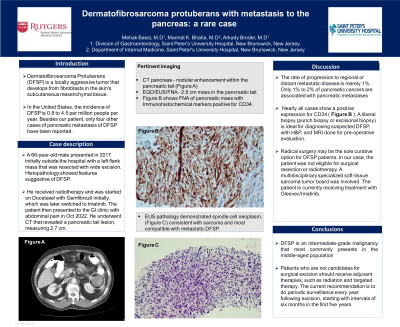Sunday Poster Session
Category: Biliary/Pancreas
P0108 - Pancreatic Metastasis of Dermatofibrosarcoma Protuberans: A Rare Case
Sunday, October 22, 2023
3:30 PM - 7:00 PM PT
Location: Exhibit Hall

Has Audio
- MB
Mehak Bassi, MD
Saint Peter's University Hospital
New Brunswick, NJ
Presenting Author(s)
Mehak Bassi, MD1, Mannat Kaur Bhatia, MBBS1, Abhijeet Chaubal, MBBS, MD1, Arkady Broder, MD2
1Saint Peter's University Hospital, New Brunswick, NJ; 2Saint Peter's University Hospital / Robert Wood Johnson Medical School, New Brunswick, NJ
Introduction: Dermatofibrosarcoma Protuberans (DFSP) is a locally aggressive tumor that develops from fibroblasts in the subcutaneous mesenchymal tissue of the skin. Metastasis in DFSP is relatively uncommon, occurring in approximately 5% of cases. However, when metastasis does occur, it usually affects the lungs (50%), followed by the bones and other distant sites. DFSP is characterized by a specific genetic alteration called the COL1A1-PDGF fusion gene. Targeted therapies that inhibit the PDGF receptor, such as imatinib mesylate, have shown promising results in treating metastatic DFSP. Imatinib is often considered as a first-line treatment for metastatic DFSP, particularly in patients with unresectable or widespread disease. The incidence of metastatic DFSP involving the pancreas is not well-documented in the medical literature. Since pancreatic metastases from soft tissue sarcoma (STS) are uncommon, there is currently no established treatment protocol. In this discussion, we present a rare case of DFSP metastatic to the pancreas.
Case Description/Methods: A 66-year-old male with a history of DFSP in the left retroperitoneal area, previously treated with wide excision and radiation in 2017, was referred to our ambulatory clinic in October 2022 due to abdominal pain. A CT scan revealed a 2.7 cm mass in the pancreatic tail (Figure A). To further investigate the pancreatic lesion, the patient underwent endoscopic ultrasound-guided fine-needle aspiration (EUS/FNA). The FNA of the mass demonstrated a spindle cell neoplasm in a herringbone pattern (Figure B). Immunohistochemistry testing for CD34 was positive, confirming the diagnosis of metastatic DFSP (Figure C). A multidisciplinary board discussed this case, deeming the patient not a surgical candidate for distal pancreatectomy. The patient was started on Imatinib mesylate. The patient was further referred to a tertiary care hospital which conducted a clinical trial for metastatic DFSP.
Discussion: Metastatic DFSP to the pancreas is extremely rare. Treatment options depend on factors such as the extent of metastasis and patient suitability. Surgical resection may be considered for localized tumors, while systemic therapies like chemotherapy or targeted therapy could be used. Overall, management requires a multidisciplinary approach and consultation with specialists experienced in sarcoma treatment. This case report raises clinical awareness of this rare sarcoma, its persistent recurrence, and the need for closer follow-up in these patients.

Disclosures:
Mehak Bassi, MD1, Mannat Kaur Bhatia, MBBS1, Abhijeet Chaubal, MBBS, MD1, Arkady Broder, MD2. P0108 - Pancreatic Metastasis of Dermatofibrosarcoma Protuberans: A Rare Case, ACG 2023 Annual Scientific Meeting Abstracts. Vancouver, BC, Canada: American College of Gastroenterology.
1Saint Peter's University Hospital, New Brunswick, NJ; 2Saint Peter's University Hospital / Robert Wood Johnson Medical School, New Brunswick, NJ
Introduction: Dermatofibrosarcoma Protuberans (DFSP) is a locally aggressive tumor that develops from fibroblasts in the subcutaneous mesenchymal tissue of the skin. Metastasis in DFSP is relatively uncommon, occurring in approximately 5% of cases. However, when metastasis does occur, it usually affects the lungs (50%), followed by the bones and other distant sites. DFSP is characterized by a specific genetic alteration called the COL1A1-PDGF fusion gene. Targeted therapies that inhibit the PDGF receptor, such as imatinib mesylate, have shown promising results in treating metastatic DFSP. Imatinib is often considered as a first-line treatment for metastatic DFSP, particularly in patients with unresectable or widespread disease. The incidence of metastatic DFSP involving the pancreas is not well-documented in the medical literature. Since pancreatic metastases from soft tissue sarcoma (STS) are uncommon, there is currently no established treatment protocol. In this discussion, we present a rare case of DFSP metastatic to the pancreas.
Case Description/Methods: A 66-year-old male with a history of DFSP in the left retroperitoneal area, previously treated with wide excision and radiation in 2017, was referred to our ambulatory clinic in October 2022 due to abdominal pain. A CT scan revealed a 2.7 cm mass in the pancreatic tail (Figure A). To further investigate the pancreatic lesion, the patient underwent endoscopic ultrasound-guided fine-needle aspiration (EUS/FNA). The FNA of the mass demonstrated a spindle cell neoplasm in a herringbone pattern (Figure B). Immunohistochemistry testing for CD34 was positive, confirming the diagnosis of metastatic DFSP (Figure C). A multidisciplinary board discussed this case, deeming the patient not a surgical candidate for distal pancreatectomy. The patient was started on Imatinib mesylate. The patient was further referred to a tertiary care hospital which conducted a clinical trial for metastatic DFSP.
Discussion: Metastatic DFSP to the pancreas is extremely rare. Treatment options depend on factors such as the extent of metastasis and patient suitability. Surgical resection may be considered for localized tumors, while systemic therapies like chemotherapy or targeted therapy could be used. Overall, management requires a multidisciplinary approach and consultation with specialists experienced in sarcoma treatment. This case report raises clinical awareness of this rare sarcoma, its persistent recurrence, and the need for closer follow-up in these patients.

Figure: A: CT abdomen showing Pancreatic tail mass
B. Spindle cell neoplasm
C. CD 34 + staining
B. Spindle cell neoplasm
C. CD 34 + staining
Disclosures:
Mehak Bassi indicated no relevant financial relationships.
Mannat Kaur Bhatia indicated no relevant financial relationships.
Abhijeet Chaubal indicated no relevant financial relationships.
Arkady Broder indicated no relevant financial relationships.
Mehak Bassi, MD1, Mannat Kaur Bhatia, MBBS1, Abhijeet Chaubal, MBBS, MD1, Arkady Broder, MD2. P0108 - Pancreatic Metastasis of Dermatofibrosarcoma Protuberans: A Rare Case, ACG 2023 Annual Scientific Meeting Abstracts. Vancouver, BC, Canada: American College of Gastroenterology.
